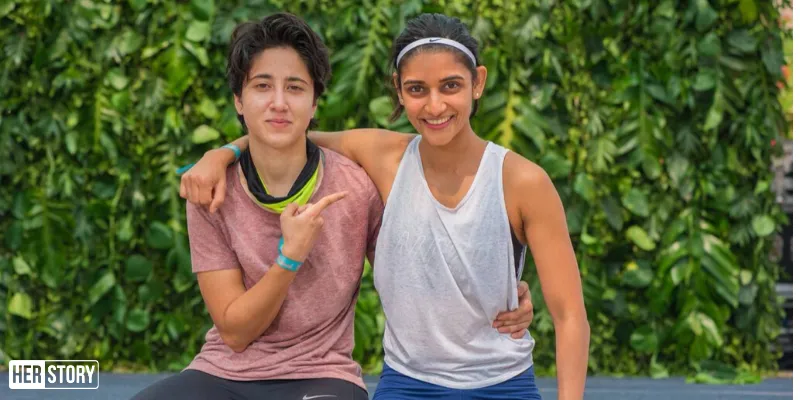These women-led platforms and communities are helping other women achieve their goals
From women in sex tech, how to network better, to helping women achieve their fitness goals, these startups and communities are helping woman in the true spirit of sisterhood.
It’s often said women are women’s best allies. Women across geographies and ages often share similar experiences and thus, can form a chain of sisterhood.
When women stand together or form communities, they are better equipped to tackle social challenges. Shared experiences help them understand each other better in their careers, passions, workplaces, and more.
Facing various challenges alone can be daunting and thus, women often come together to help each other.
Today, we bring you stories of women who created platforms and communities to help others like themselves.
Pooja Goel, Pink Collar Professionals

Pooja Geol worked at corporates like Infosys and Edgeverve Systems for three years before pursuing an MBA in Sales & Marketing in 2018. During her time at IMT Ghaziabad, she developed an interest in startups and devoted time to understanding and learning about the processes involved in becoming an entrepreneur.
Exploring the startup ecosystem and attending multiple women-oriented summits, it became evident to Pooja that women in the startup ecosystem played a very small part in the larger picture. This gap in ideal numbers led her to come with the idea of Pink Collar Professionals - a platform to help women entrepreneurs.
Through PCP, Pooja helps women entrepreneurs chart plans for their success, transform their businesses to go digital and scale successfully. In a span of just three months, Pooja has assisted 34 women entrepreneurs to understand their businesses better and has successfully helped 12 women to work on digital transformation. She is currently providing a three-month mentorship to four businesses. She has been working with entrepreneurs from various sectors including edtech, online healthcare, gifting, clothing, and handmade jewellery.
Iti Rawat, Women Entrepreneurs for Transformation

Iti Rawat, Founder of WEFT.
Iti Rawat quit her corporate job to become an entrepreneur in 2018. At 31, she decided to start up on her own with a training and consultancy business, Thinkhall. Two years into the business, she hit a slump. She needed funds and help to bring the company out of the situation but couldn't find the resources to do so. That’s when she realised women entrepreneurs could benefit from a support system to help them tide over such crises.
To help other women entrepreneurs, she created Woman Entrepreneurs for Transformation (WEFT) - a not-for-profit organisation to provide support and a networking platform for women entrepreneurs.
Started in August 2018, WEFT has over 1,000 women entrepreneurs in its network. It organises services and events for networking and building an ecosystem for entrepreneurs.
Ragini Das, Leap

Ragini Das, along with Anand Sinha, both ex- executives, have launched Leap, a platform helps mid-career women climb the ladder and reach leadership positions. Initially, available to members in the Delhi-NCR region, the powerful private network will later be open to women from all over India.
Leap’s target audience is women in the 30-35 age group who are at the mid-career level. While they have currently chosen 30 founding members, there are 2,000 people on its waitlist, from companies like Google, Netflix, McKinsey & Co., Amazon, , Zomato, BCG, and Teach for India.
Apart from one-on-one offline connect meets, the membership also offers therapy sessions and the opportunity to be part of a 15-member peer group that meets every two months. It will have a Speaker Series, where it will bring in industry icons for smaller, intimate sessions.
Polly Rodriguez and Lidia Bonilla, Women of Sex Tech

Polly Rodriguez (L) and Lidia Bonilla (R)(Photo Credit: Sarah Hylton, NYT)
In 2014, Polly and Sarah Jayne co-founded their sextech startup Unbound. Polly believes that sextech is a lucrative sector but stereotypes and the assumption of it being a “vice” industry makes it a very challenging industry to start up in, especially for women.
Her family and even the venture capitalists she approached made her feel “ashamed” of the products she was building. Even getting an office and opening a bank account for her business was difficult.
This prompted Polly and Lidia Bonilla started Women of Sex Tech. It is a platform that unites women entrepreneurs in the industry and provides them a platform to help them tackle the challenges of starting up in the industry.
Swetha Subbiah and Tanvie Hans, Sisters in Sweat

Tanvie Hans (L) and Swetha Subbiah (R)
Swetha Subbiah, a Nike certified fitness trainer and former Tottenham and Fulham footballer Tanvie Hans started their entrepreneurial journey in fitness one Sunday by teaching a group of friends how to play football. It has now turned into Sisters in Sweat, a community of 350 women passionate about the sport.
Swetha and Tanvie still continue to provide women from various walks of life an opportunity to take up and learn football. Apart from Sunday sessions, it provides football training during the week and beginner sessions to women. Last year, it also organised its first football tournament for women.
The community also utilises expertise from community members to impart various skills like yoga, dancing to build a community of women and sisterhood.
Edited by Rekha Balakrishnan












